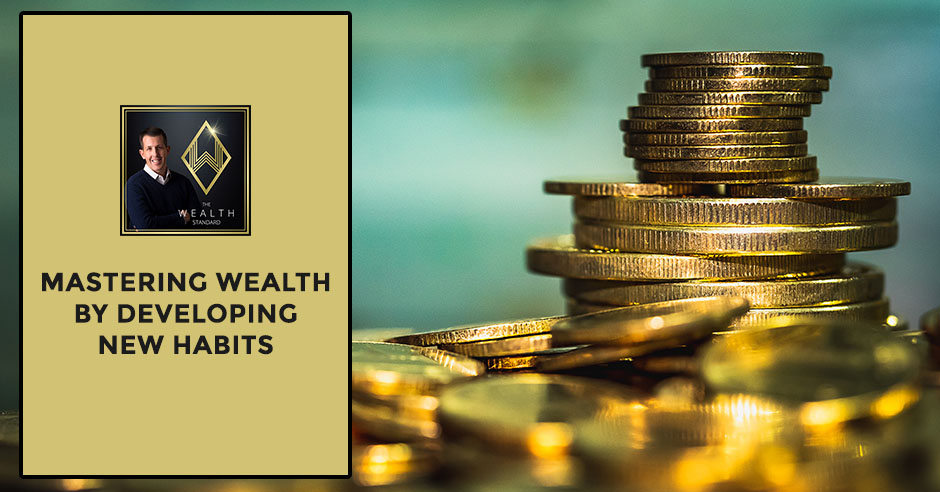Mastering Wealth By Developing New Habits
Podcast: Play in new window | Download

In order to master wealth, you need to master your habits. You need to develop new habits so that you don’t just do the same thing over and over. Wealth is a direct result of habits. Join your host Patrick Donohoe as he talks about the different levels of masteries and why habits are crucial to life. Replace your existing habits with new ones today!
—
Watch the episode here:
Listen to the podcast here:
Mastering Wealth By Developing New Habits
Can you learn how to be wealthy? In my experience, wealth is a direct result of habits. You don’t simply read a book, go to a conference, watch a YouTube video and end up being wealthy. At least, that’s my experience. There are some who roll the dice and hit seven. They play Blackjack, bet everything and hit 21. To me, that’s not wealth. That’s a risk. If that’s a strategy or a pattern you want to develop, that doesn’t usually end up producing good results. I believe that wealth is when principled ideas are baked into our nervous system. Our actions to the dynamic or the ever-changing experiences of life are more automatic or unconscious.
How do you get to that point when these principled ideas are baked into your nervous system? First, it’s understanding that ideas and information must travel through three levels particularly. The first level is Cognitive Mastery, which is understanding the ideas and information rationally, and how they apply to the circumstances of your life and what you want.
The second level is Emotional Mastery. This is where you understand that emotions are simply signaling something and they’re there to serve you. They’re there usually to protect you. It’s understanding the nature and the purpose of those emotions, and then figuring out a way to get them to serve you as opposed to how most people treat their emotions where they want to suppress, not embrace.

Master Wealth: Wealth is when principled ideas are baked into your nervous system. That your actions to the ever-changing experiences of life are more automatic.
The third is Physical Mastery. Physical mastery is when you don’t even think about your actions or reactions, or your decisions. They’re part of you. An easy example of physical mastery is sports. I played ice hockey growing up. I’m in my 40s but with the experience I had growing up playing over and over again street hockey, pond hockey, youth hockey in high school and then college, my body understands how to play hockey. I don’t have to think about it now. Now I’m older, slower, weigh a little bit more than I did when I was younger. At the same time, my body remembers how to skate, pass and shoot. When I played during the summers in a men’s league, I don’t have to think about it. That is physical mastery.
I’ll give you another example as it relates to the new circumstances of our life because that’s an existing circumstance of life. Playing a new game but it’s still the same game. A few months ago, my wife was somewhat critical of how I was acting and she’s usually right. I brought some challenges from work home and it was impacting how present I was for her as well as my kids. She said to me, “With everything you read, all these conferences that you go to, and all the money you’re spending to improve yourself as a human being, our family, the business, you think you’ve figured out a way to show up better when you come home.”
My initial response, you can imagine, the emotional triggers were going off. Many years ago, I would have responded completely differently than I did, but I understood how those responses would serve me or not serve me. They would not serve me. It would have been a rocky road if I responded the way I did many years ago. At that moment, I swore to myself a few times in my head, and then snapped out of it and figured out a way to be present with my family. I fell into those old patterns. We all do. It’s how long we spend suffering in those old patterns if they’re patterns that do not serve us.
Wealth is a direct result of habits. Click To TweetA famous quote that I love is, “We are what we repeatedly do. Excellence is not an act, it’s a habit.” This is usually accredited to Aristotle. It was a guy in the early 1900s named Will Durant who took two of Aristotle’s quotes and summarize them within that quote. This is the lesson from these experiences that I’ve been talking about. We have the illusion that we are consciously in control of our day-to-day experiences. I want you to consider just for a moment the possibility that you have zero control. Your responses to the daily circumstances of life are automatic. They are already baked in.
I don’t believe in absolutes but I want you to consider for a moment that how you are going to show up is already baked into your body or your nervous system. If you are happy with the results that you want in life, great. At the same time, we’re wired to grow. There is a paradox there because if you’re wired to grow, it means that you need to have different results than you have now. Trying to look at the same patterns and habits as before producing new results leads to the definition of insanity.
It’s not going to come from our patterns and habits of the past. We want new results. We first have to understand how patterns and habits are developed, and then strategically design some situations and strategies to get rid of or reprogram our old habits and patterns and replace them with new ones. I believe that there are a few primary variables in developing new habits. Number one that’s counterintuitive to how society operates, we’re used to information at our disposal immediately. We’re used to instant food, instant entertainment, everything’s instant.

Master Wealth: Replace your existing patterns and habits with new ones. You have to really understand some psychology, but also that it takes a bit of time to develop new habits.
I believe that patterns and habits are the opposite. It takes a while, especially as we get older. Replacing existing patterns and habits with new ones. We have to understand some psychology. We have to understand that it takes a bit of time to develop these habits but they’re worth it. Here are a couple of variables. The first variable is designing the pattern or the habit or actions. We want to design them after what’s proven to work. We have lots of examples of the different patterns as it relates to wealth and finance that work.
The second is designing a strategy that either forces us to do it or a strategy that allows repetition over and over again to build into our nervous system these habits. A great example that I love to use is CrossFit. It’s a different workout every single day. It’s hard. I don’t have to think about that. The pattern that I developed was getting up at a certain hour and showing up every single day. That’s a strategic design to get a good workout every single day.
The final variable is establishing stakes, where you recognize that if you don’t change or grow, what’s going to happen? That’s a negative state but you also start to identify the positives. What you’re going to gain? What your experience of life is going to be like if you develop these habits? Over the next two episodes of the show, I’m going to talk about the two primary areas of wealth building. I would say the best habits in those areas. The first area is going to be how you produce income. The second area is what you do with your money.
You are what you repeatedly do. Excellence is not an act. It's a habit. Click To TweetI’m going to talk about the habits that I have seen serve people. I’ve seen these habits produce millions, tens of millions, hundreds of millions for people that I know. From a production standpoint, how you make money, and then also investing habits, saving habits, spending habits. Ways in which you can develop these habits and patterns that will ultimately serve you.
Next two episodes, make sure you check back. It’s going to be a fun little series here. Thanks for reading. You got the website for more information about the show and other resources. We’ve updated the resource page and lots of cool stuff are on there. Go check that out. We will talk to you next time, where we will get into the first area of wealth building, which is making money.
Love the show? Subscribe, rate, review, and share!
















